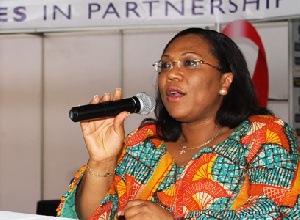The Ghana Aids Commission has appealed for financial support from the private sector to meet its funding needs to enable it to procure more test kits and anti-retroviral drugs to manage the national response.
The Director-General of the Ghana AIDS Commission, Dr. Angela El-Adas said the country has achieved positive results in the management of the HIV infection over the decade.
Recent reports indicate that the HIV situation in Ghana has improved although there is more room for improvement. Despite efforts at containing the disease, some people continue to die from AIDS, but there was a 30 per cent reduction in annual AIDS deaths from 16,320 in 2010 to 10,074 in 2013.
Among the successes of the Ghana Aids Commission and its partners is a significant increase in demand for HIV prevention, treatment, care and support services, driving up the cost of implementing the national strategic plan for HIV and AIDS.
Speaking at a private sector roundtable discussion on resource mobilization for HIV/Aids response, Director General of the Ghana Aids Commission, Dr. El-Adas said more funds are required to keep the pace of work and reaching the vulnerable.
She said as a result of Ghana’s lower middle income status, donor support for the commission to manage the national response has declined.
Dr. El Adas said “we have the challenge of the test kits which is used for the day to day testing and that is hard to get, how much more moving into campaign mode? Due to the global target to test about 60 million people a year, the one million test kits we have is just a drop in the ocean.”
Minister of State in charge of Private Sector Development, Dr. Rashid Pelpuo on his part he said total commitment was required to stem the tide of HIV infections through the mobilisation of funds locally to sustain the gains made in the national response.
He said the overall involvement of the private sector in the national HIV response had been quite minimal relative to its capabilities.
The representatives of the private sector pledged to support the initiative by the commission to raise funds to carry out its programmes.
The country recorded a consistent decline in general adult prevalence of HIV from 3.6 per cent in 2003 to 1.3 per cent in 2013.
Ghana had seen a consistent reduction in new HIV infections from baseline of 25,869 in 2009 to 7,812 new infections in 2013.
Health News of Sunday, 17 April 2016
Source: tv3network.com

















